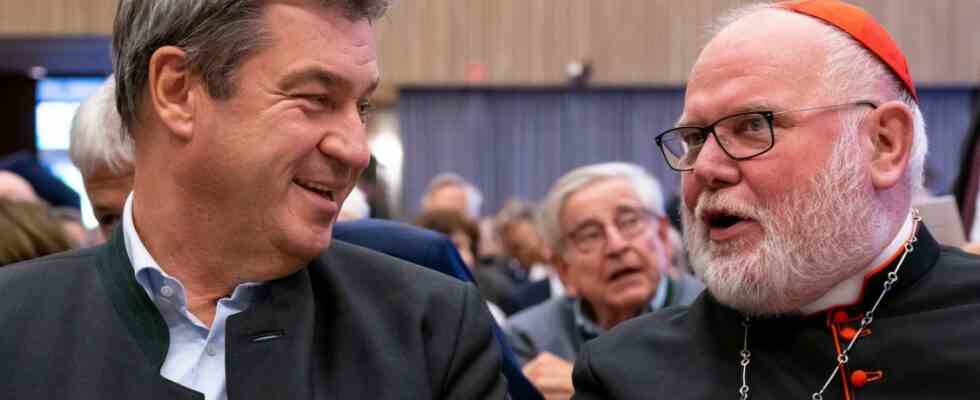Markus Söder wouldn’t be Markus Söder if he wasn’t concerned about the effect that evening. “Coming is a statement, it’s a commitment, it’s appreciation, and it’s a thank you,” he says right at the beginning of his quarter-hour greeting at the annual reception of the Archdiocese of Munich and Freising, and towards the end he adds: “I also consciously went along on Corpus Christi to set an example.” Look, here I am, that’s supposed to mean, the father of the country stands by the side of the church. But much of what the Prime Minister says in between does not sound like approval. Söder announces few good news.
“There has been a permanent low over the church for a long time,” he says. “There are resignations. Many.” And in the fall, the number could increase. “If things get tight financially,” he predicts, “then one or the other will think: Can I still afford it, do I still want to afford it?” This development is to be taken “very, very seriously”.
“I am expressly committed to the church as an institution,” says Söder, “but everyone must be clear that if the number of members continues like this, those who have a fundamentally different view will question special positions and privileges and address whether all of this is still up to date is whether you don’t have to change that.”
The annual reception was canceled twice recently due to the corona pandemic. In order to offer the virus fewer ways of spreading, Cardinal Reinhard Marx refrained from the usual parade. But that doesn’t make the most prominent of the 500 guests distance themselves from the most pressing topic at the moment.
Jesus meets church bodies: a funny idea for Söder
Söder: “We all know what the reason for this difficult time is: of course, the abuse discussion that has been going on for many years.” In individual cases one looks at this “into a serious abyss”https://www.sueddeutsche.de/muenchen/.”Some ask the question: Was the reaction too late? Was the reaction in too many individual voices, not unified enough? Were the compensations too low in the beginning? Are they appropriate now? Wouldn’t it take more respect and empathy and compassion for those affected?” Söder’s answer: “You can say all that.”
For a reception that was arranged in a friendly manner with a cappella melodies (“Hoamat”, “It’s not always easy I zum sei”) performed in dirndls and lederhosen, these were remarkably clear words. And even clearer than the declaration of trust in the host (“But I would also like to pay my personal respect to Cardinal Marx, who took on a lot during this time and who also tried not only to moderate this process, but to lead it”) the appeal for more commitment: “I miss the voice of the churches,” warned Söder, “it has become quieter.”
His side swipe is also meaningful: “I believe that if Jesus Christ came to us today, he would inspire people like a superstar,” says the avowed Protestant Christian, “but an encounter with church bodies would probably shock both sides.”
The Glexit, the exodus of the faithful, also caught the highly committed
The lecture by Hans Tremmel showed that Söder does not have this opinion exclusively. After twelve years, he will soon give up the chairmanship of the diocesan council of Catholics in the Archdiocese of Munich and Freising. “Truly terrible things have happened under our roof. The church has destroyed people. That cannot be offset or put into perspective with good schools, highly professional social institutions and committed pastors. The horrific crimes in the area of the church remain inexcusable. Period,” he said without hesitation . “The Glexit, the exodus of the faithful, is taking on more and more painful dimensions. Too many are just annoyed by the church. In the meantime, even the most committed are leaving us.”
The institution sees Tremmel at a “dead point”. What the chairman of the highest lay body in the archdiocese would like: “That the new basic order accepts that people can be and live very differently and that their diversity is indispensable for the work in the Lord’s vineyard. That the church marches at the forefront when it It’s about human rights and equality between men and women, about fair and just structures.”
Before going out into the garden of the Catholic Academy, under the relevant inscribed trees (oak, Quercus turneri: “For your sake I destroyed the Amorites. They were as tall as cedars and as strong as oaks, but I cut them out root and branch .” Amos 2:9), on salmon in brick dough, lasagne of wild and meadow mushrooms and stuffed shoulder of veal, Reinhard Marx once again defended his approach to dealing with the abuse: “Some have said: Cardinal, why are we doing this with this report “What’s that supposed to mean? More people are leaving the church. But should I keep it quiet, should we do the enlightenment in the sense: It’s best not to talk about it anymore, not to look back, just forward. That’s not the way.” But: “Let’s go the way of education, which hurts. The way of transparency, prevention, cooperation with the state.”
All of this has been going on since 2010. All religions need a process of purification and renewal. The task now is to find out what a religion could look like in a modern, enlightened society. The word turning point came up often. But it sounded more like a sermon than a promise.

